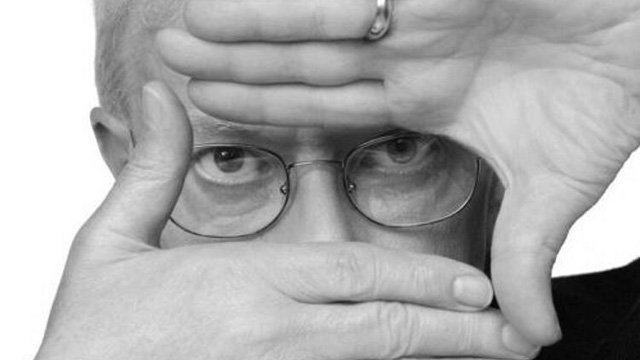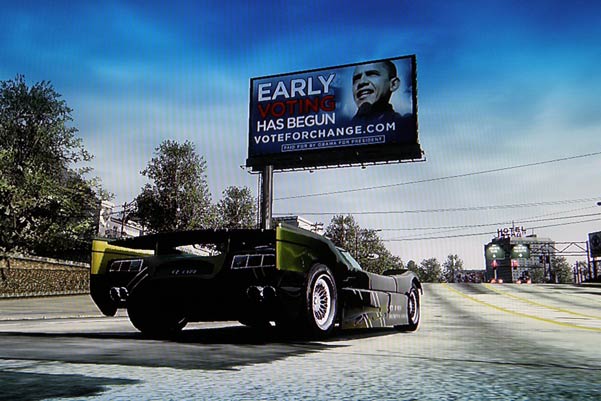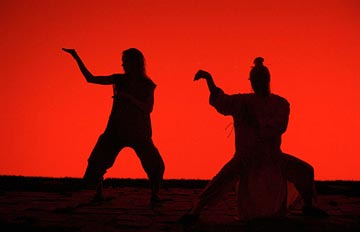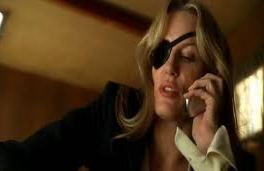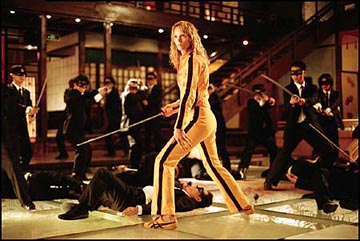 Well, I’m probably going to lose some fanboy cred for this, but I found Kill Bill (billed everywhere — even, ridiculously, in the credits — as “the 4th film by Quentin Tarantino”) to be a considerable disappointment. The movie starts off well…Uma’s The Bride covered in blood, some choice words, a gunshot, fade to black, Nancy Sinatra…so far, so good. Like an old friend back in town, it almost seemed at first we’d be getting something missing for too long, something along the lines of Reservoir Dogs, Pulp Fiction, and Jackie Brown. But then, alas, it becomes all too clear that QT has ventured deep into George Lucas territory. In other words, Kill Bill is an overripe, overlong flick by a director infatuated with his own cleverness and brilliance, one who’s clearly surrounded by entirely too many sycophantic yes-men. To wit:
Well, I’m probably going to lose some fanboy cred for this, but I found Kill Bill (billed everywhere — even, ridiculously, in the credits — as “the 4th film by Quentin Tarantino”) to be a considerable disappointment. The movie starts off well…Uma’s The Bride covered in blood, some choice words, a gunshot, fade to black, Nancy Sinatra…so far, so good. Like an old friend back in town, it almost seemed at first we’d be getting something missing for too long, something along the lines of Reservoir Dogs, Pulp Fiction, and Jackie Brown. But then, alas, it becomes all too clear that QT has ventured deep into George Lucas territory. In other words, Kill Bill is an overripe, overlong flick by a director infatuated with his own cleverness and brilliance, one who’s clearly surrounded by entirely too many sycophantic yes-men. To wit:
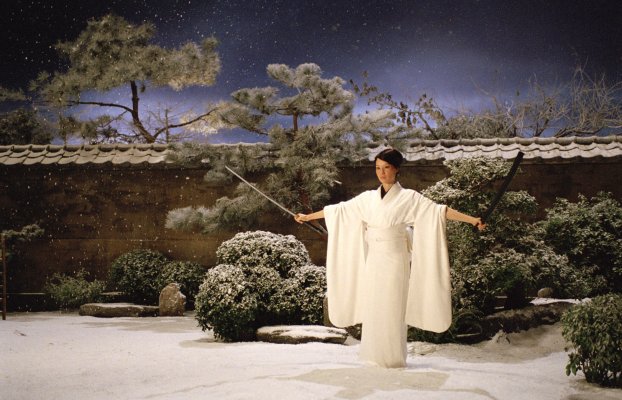 1) The Editing. Perhaps it’s a result of chopping the film in two, but there are several scenes here badly in need of shortening, which is doubly strange given how perfectly — languidly, with occasional jolts and rushes — QT’s first three films move. Take, for example, all of Chapter 4 (The Man from Okinawa), and particularly the sake-pouring nonsense. Ok, I get it — it’s Sonny Chiba (and, I’ve since been informed, Gordon Liu)…but let’s move on. Jackie Brown moves at a leisurely pace, yet I was and am never bored. In Kill Bill I was stifling yawns. Or take the introduction of Buck’s Pussy Wagon (which at best is a sophomoric, throwaway joke anyway.) Uma gets the keys from Buck, beats him a final time, looks for the car, finds the car, looks at the keys, looks at the car, gets in the car. All this could’ve been condensed into one edit (from the hospital floor to Uma dragging herself into the Wagon), particularly as the joke was already made in Chapter 1 anyway.
1) The Editing. Perhaps it’s a result of chopping the film in two, but there are several scenes here badly in need of shortening, which is doubly strange given how perfectly — languidly, with occasional jolts and rushes — QT’s first three films move. Take, for example, all of Chapter 4 (The Man from Okinawa), and particularly the sake-pouring nonsense. Ok, I get it — it’s Sonny Chiba (and, I’ve since been informed, Gordon Liu)…but let’s move on. Jackie Brown moves at a leisurely pace, yet I was and am never bored. In Kill Bill I was stifling yawns. Or take the introduction of Buck’s Pussy Wagon (which at best is a sophomoric, throwaway joke anyway.) Uma gets the keys from Buck, beats him a final time, looks for the car, finds the car, looks at the keys, looks at the car, gets in the car. All this could’ve been condensed into one edit (from the hospital floor to Uma dragging herself into the Wagon), particularly as the joke was already made in Chapter 1 anyway.
2) The Dialogue. With the possible exception of Lucy Liu’s words of wisdom for the Yakuza council — one of the best moments in the film — there is hardly a single memorable line in all of Kill Bill. Again, this is bizarre for a Tarantino flick, which as everyone knows have been distinguished by their dialogue. Ok, so samurai are generally strong, silent types…that doesn’t forgive the banality of what’s actually being said most of the time. “Silly rabbit…Trix are for kids”? C’mon. And, aside from the ridiculous number of grindhouse chop-socky in-jokes, most of the pop-culture visuals in Kill Bill seem lazy and off-hand (For example, the fellow in the Charlie Brown kimono – which not only added nothing to the film but could be seen coming a mile away.)
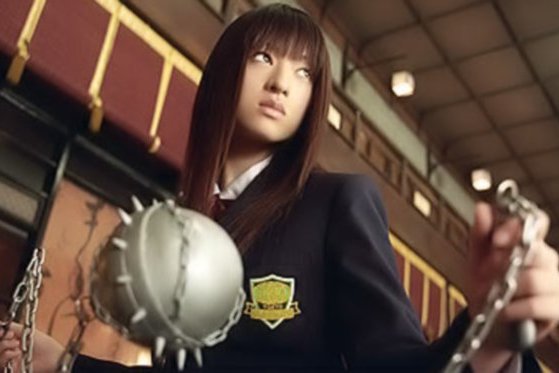 3. The Action. Of course QT has no obligation to make movies like the ones he’s made previously, so both the editing and dialogue problems could have been overlooked if Kill Bill had succeeded in its main intent. But, sadly, it doesn’t. Amazingly, given the input of Master Yuen Wo-Ping, almost all of the action sequences in Kill Bill are dull, stilted, and boring, and none more so than the much-hyped House of Blue Leaves. Really. I was shocked at how off they seemed to be. Perhaps its because Uma Thurman couldn’t handle the martial arts choreography for extended shots, but I think it’s more likely that QT just isn’t a very good action director. Too many quick edits, too many goofy shots (the blue silhouette sequence was embarrassing, as was the spanking at the end.)….It’s just sad. Even fights that held great promise (Go-Go Yubari, a homicidal Japanese schoolgirl with a tricked-up mace…really, how can you screw this up? Same goes for O-Ren-Ishii in the snow) seemed flat and lifeless. Somewhere down the pike, QT must’ve decided that gore is the end-all, be-all of a good action sequence, but arterial sprays aside, there’s really not much to see here (and the whole hilarious gore bit was done better in films like Dead Alive anyway.) QT made a point recently of attacking the fights in The Matrix movies, but I’ll take those anyday over the jumbled morass of bad wire-fu and chop edits on display here. And one needs only to recall the breathtaking wire-fu fights of Crouching Tiger, Hidden Dragon, where the camera pulls back and allows the combatants to strut their stuff in extended takes, to see how badly misplayed QT’s action edits are here.
3. The Action. Of course QT has no obligation to make movies like the ones he’s made previously, so both the editing and dialogue problems could have been overlooked if Kill Bill had succeeded in its main intent. But, sadly, it doesn’t. Amazingly, given the input of Master Yuen Wo-Ping, almost all of the action sequences in Kill Bill are dull, stilted, and boring, and none more so than the much-hyped House of Blue Leaves. Really. I was shocked at how off they seemed to be. Perhaps its because Uma Thurman couldn’t handle the martial arts choreography for extended shots, but I think it’s more likely that QT just isn’t a very good action director. Too many quick edits, too many goofy shots (the blue silhouette sequence was embarrassing, as was the spanking at the end.)….It’s just sad. Even fights that held great promise (Go-Go Yubari, a homicidal Japanese schoolgirl with a tricked-up mace…really, how can you screw this up? Same goes for O-Ren-Ishii in the snow) seemed flat and lifeless. Somewhere down the pike, QT must’ve decided that gore is the end-all, be-all of a good action sequence, but arterial sprays aside, there’s really not much to see here (and the whole hilarious gore bit was done better in films like Dead Alive anyway.) QT made a point recently of attacking the fights in The Matrix movies, but I’ll take those anyday over the jumbled morass of bad wire-fu and chop edits on display here. And one needs only to recall the breathtaking wire-fu fights of Crouching Tiger, Hidden Dragon, where the camera pulls back and allows the combatants to strut their stuff in extended takes, to see how badly misplayed QT’s action edits are here.
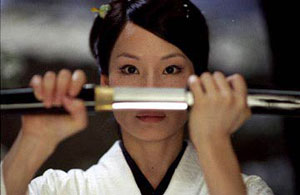 The Upside: Well, not much, really. There’s some great opportunities here, and I’d say Tarantino squanders most of ’em. I liked the anime sequence in the middle of the film, and the introduction of O-Ren-Ishii’s squad (Go-Go, Sofie Fatale, etc.) had a great comic book flavor to it at first. I thought RZA’s work on the soundtrack was superb. The critics on the film geek end of the spectrum (David Edelstein, Roger Ebert) adored all the in-jokes scattered throughout the film, and I’m sure most of ’em went over my head. (I don’t think, however, that this excuses the film by any means — LotR, for example, is filled with Tolkie in-jokes while still being accessible to laypersons.) Who knows? Perhaps if Kill Bill had just been another film, I might not be so harsh about it. But I expected more from this much-heralded return of Tarantino…I hope this was just an inglorious misstep, and I’ll probably go see Vol. 2 (word is the second one is more character-driven anyway). But I thought Quentin drank his own Kool-Aid with Kill Bill: Volume One, and hopefully he’ll return to his senses someday soon.
The Upside: Well, not much, really. There’s some great opportunities here, and I’d say Tarantino squanders most of ’em. I liked the anime sequence in the middle of the film, and the introduction of O-Ren-Ishii’s squad (Go-Go, Sofie Fatale, etc.) had a great comic book flavor to it at first. I thought RZA’s work on the soundtrack was superb. The critics on the film geek end of the spectrum (David Edelstein, Roger Ebert) adored all the in-jokes scattered throughout the film, and I’m sure most of ’em went over my head. (I don’t think, however, that this excuses the film by any means — LotR, for example, is filled with Tolkie in-jokes while still being accessible to laypersons.) Who knows? Perhaps if Kill Bill had just been another film, I might not be so harsh about it. But I expected more from this much-heralded return of Tarantino…I hope this was just an inglorious misstep, and I’ll probably go see Vol. 2 (word is the second one is more character-driven anyway). But I thought Quentin drank his own Kool-Aid with Kill Bill: Volume One, and hopefully he’ll return to his senses someday soon.
